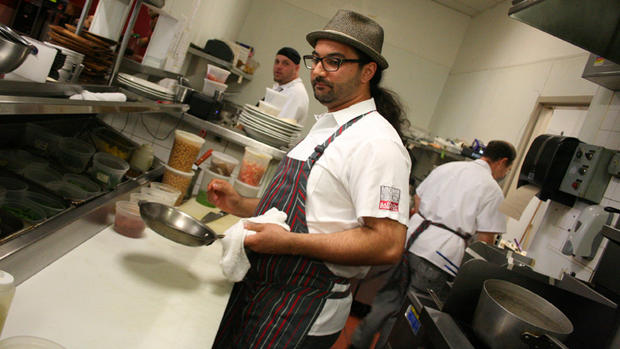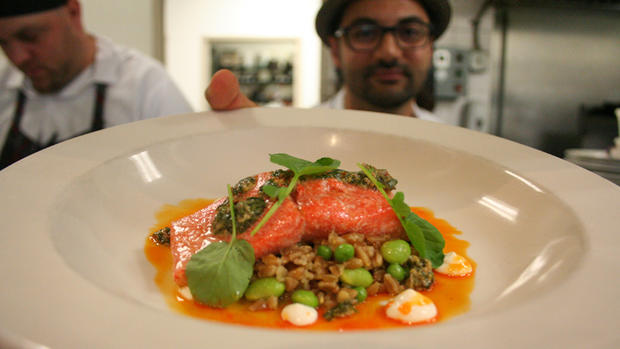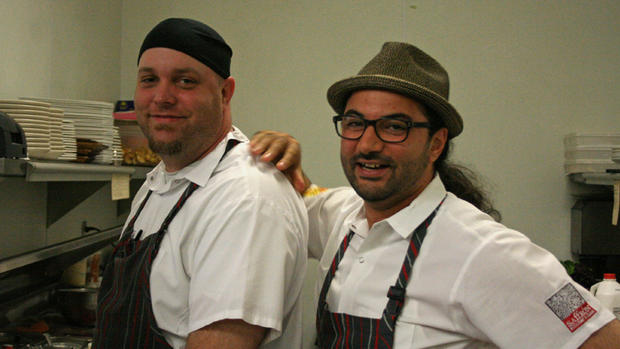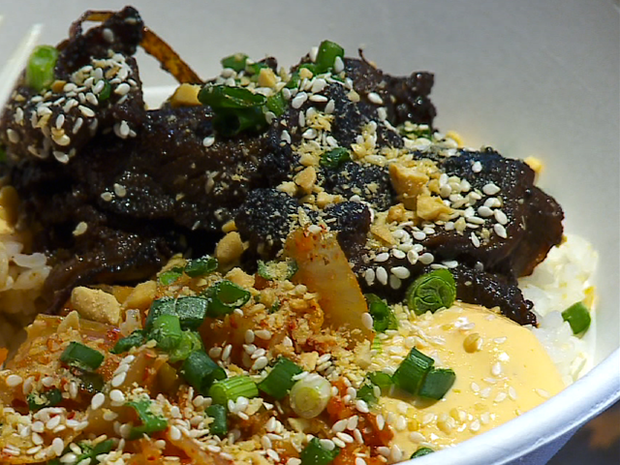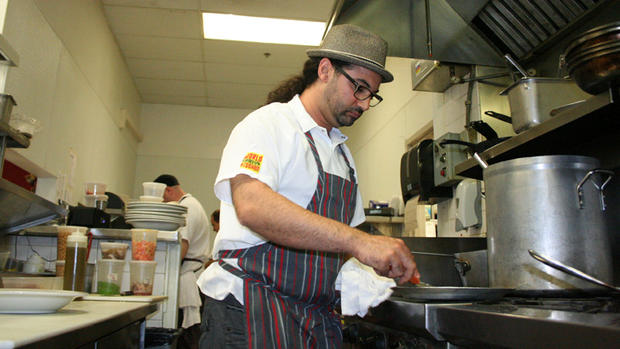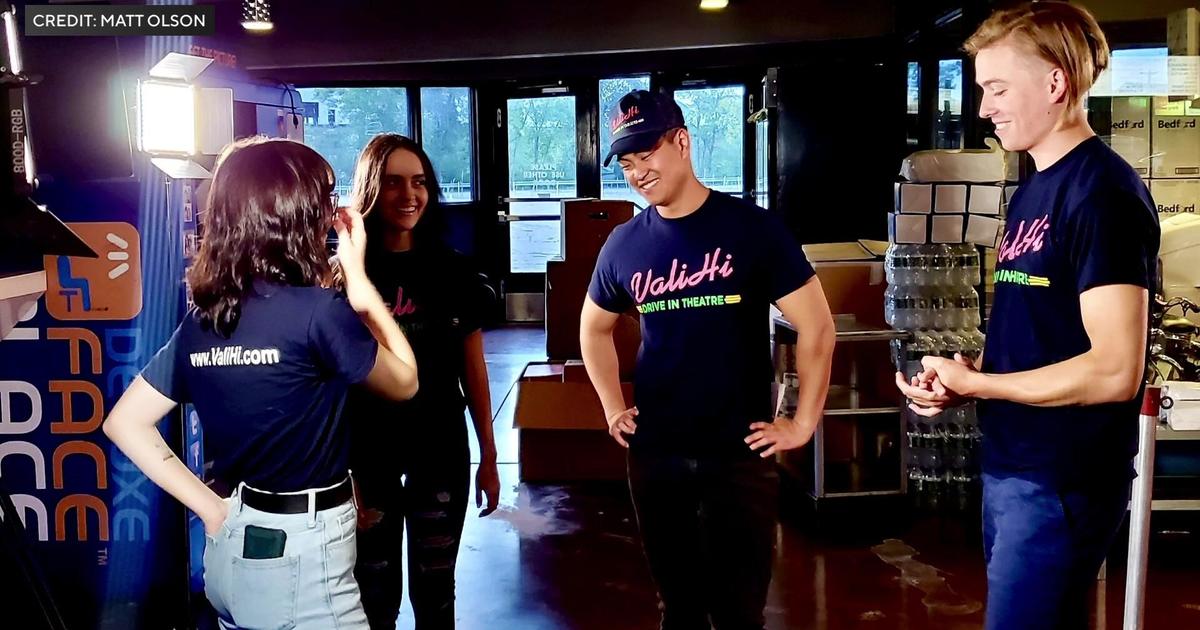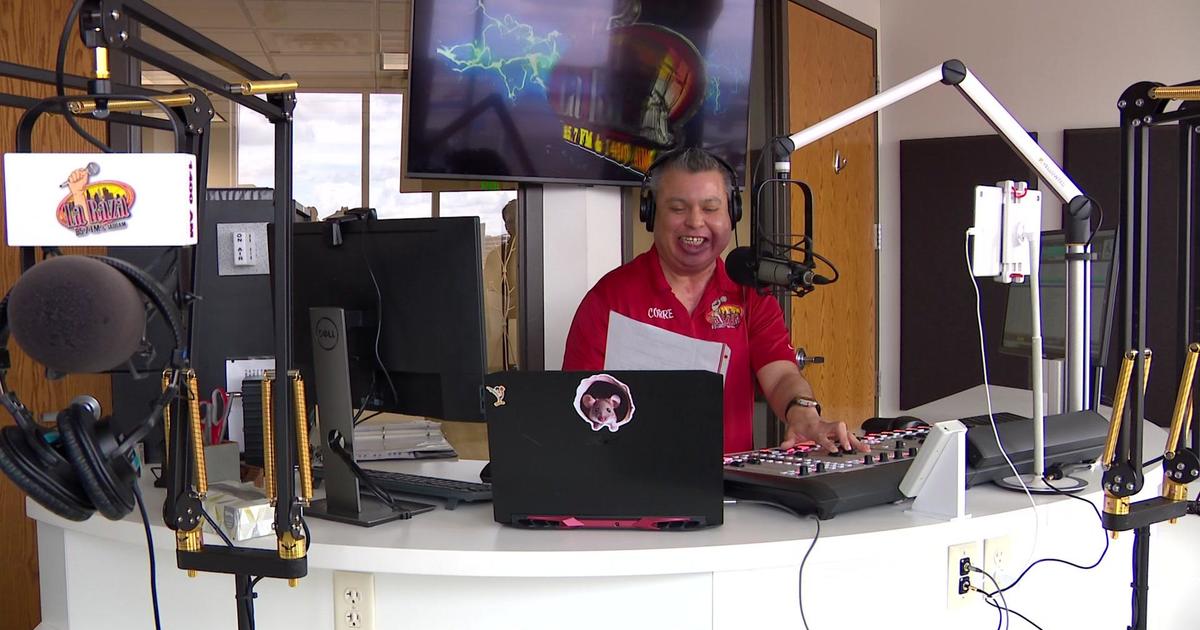Curiocity: A Chef's Profile Of Sameh Wadi, Part 2
The Twin Cities are blessed when it comes to talent in the kitchen. The culinary minds at the helm of our favorite restaurants receive critical acclaim and top honors from food enthusiasts and reviewers, alike. But who are the people behind the chef's coat? Our Chef's Profile aims to find out.
Cooking was such a large part of Sameh Wadi's upbringing it's somewhat shocking that the young and budding cook never considered it a career path until much later in life.
As we learned in Part 1 of his chef profile, his dad was a world traveler and an amazing cook, constantly bringing somewhat foreign ingredients home to experiment with in the kitchen. His mother excelled at traditional Middle Eastern fare, teaching her curious young sous chef along the way. And his grandmother, well, she was a patient, impressive woman.
"I remember hearing stories about my grandmother, where my grandfather would tell her with very short notice, 'Hey, we have 15 people coming to our house to eat tonight.' And then you just have to go and kill the chickens," he said, with a laugh. "That's the history, the culture. And it just gets passed down from generations to generations."
The dishes of his family are reflected in Wadi's cooking today – his father's global travels can be seen throughout World Street Kitchen and creations made by his mother and grandmother can be found on his menu at Saffron.
Wadi's food wins several awards, is critically acclaimed and even earned him a James Beard Rising Star Chef nomination last year. But it's not why he does it.
"It's surreal," he said. "None of the things that I do are for awards, but then once you kind of understand that people really appreciate what you do, you appreciate what you do even more. And then you're working hard to kind of keep people from ... you don't want to let people down. You want to keep them riding that high horse and happy to recommend Saffron and saying, 'Yeah, these guys know what they're doing.'"
They certainly do.
It was only two years ago that Wadi got a call to appear as the youngest contestant ever on Iron Chef America. Even for him, it was hard to believe.
"I remember that day very well. I was away from the restaurant and my brother calls me. I was very upset at him because we had run out of beans for our hummus. Beans for hummus take about six or eight hours to cook and no one told me we were out of beans and here I am, out at the grocery store, picking up beans so I can make this hummus and I was very upset," he said. "I was having a very, very tough day."
The conversation went something like this:
Saed (Sameh's brother): "Hey, are you sitting down? I have some information for you."
Sameh: "Hey man, I don't have time for you right now. Just let me be. I know I yelled at you before I left here and I'm very upset because I'm a chef, it's not because I don't love you."
Saed: "Well, sit down. I have gotta tell you some stuff."
Sameh: "I don't have time for you. I gotta go."
Saed: "Well The Food Network called."
Sameh: "What? Do we owe them money? Just pay them."
Saed: "No, they want you to be on a show."
Sameh: "What? Diners, Drive-Ins and Dives?" [Sameh hangs up.]
[Saed calls back.]
Saed: "No, I'm serious. I'm serious. They called. They want to talk to you. They want you to be on Iron Chef America."
Sameh: "Saed, I don't have time for this bullsh--. I gotta go." [Sameh hangs up, again.]
After returning to the restaurant, his brother hands him a piece of paper with the name of a Food Network producer and a phone number. Wadi, a huge fan of the show, actually recognized the man's name.
"My brother wouldn't go this far to actually look up their name," he said. "Even though I was hesitant, I called the number and I was still skeptical that my brother was setting me up for something. So here I am talking to the producer of the show and I was Googling him at the same time. I said, 'Prove to me that you are who you say you are.' And he said, 'Well, I can send you an email, how about that?' Perfect."
A second later, Sameh gets an email – the production company is listed, with its logo, and it finally hits him. This is for real.
"That's when I just absolutely freaked out. Like, wow, this is actually happening for real. I started jumping up and down. And yeah, it took probably a month for me to calm down," he said.
The rest, as they say, is history.
For more about Wadi's Iron Chef America experience, plus his biggest guilty pleasure foods and what he wants for a "last meal," check out the Q&A below.
-----
What was it like to be on Iron Chef America?
The show really, even before I was cooking professionally, I would sit and I would watch the original Iron Chef, at home alone in my room, doors closed – no one has to see what I'm doing in here. Like, I don't want any problems just let me watch this show. So the idea of a fan becoming a competitor on the show started bubbling up in my head. Here I am, a kid in the candy store. This is what I've been watching my whole life. Here I am doing it myself. It was surreal. An absolutely wonderful experience.
When you walked on to Kitchen Stadium, what was that like? Is the show what you imagined it would be?
So from the adrenaline rush and kind of being uncertain of not knowing what's going to come our way, I was just high. (Laughs) It was like a kid in a candy store, really. We watched a competition to see what actually happens during this hour of mayhem. We sat inside and we watched the show and it was absolutely insane. I can't believe that this was going to be us tomorrow.
And it's really only an hour of competition?
Yeah, for the actual competition time, you cook for one hour.
And you didn't know what you'd be given.
They give you an idea of what it could be but they're super ambiguous of what it could be so … it's not any help. It confuses you even more. For example, they said we'll maybe give you blue cheese. So how many different varieties of blue cheese are there. They give you a handful of things.
Did you sleep the night before?
No, absolutely not. No. Me and my two sous chefs were sitting down trying to formulate plans. If we get this, what do we do? If we were to get this, what do we do? And it was absolutely wonderful.
Having done Iron Chef, have you ever considered doing other cooking competitions?
We've certainly been approached before to do other cooking competitions. Cooking is in my blood and competition is in my blood – they go hand-in-hand. You just have to take it one step at a time and see if the timing is right for what we've done. It always depends on what I'm doing at the time. I would never say no to anything. I just have to think of what it is and what it means for us as a company for me to be away from here for an extended period of time.
Did you see a big difference at the restaurant after the show aired?
Absolutely. We saw an increase in business the minute that the show aired. People that kind of knew we were good but had no idea how good we were, finally had a chance to say, 'OK, we're going to come check it out.'
So switching topics, you had Saffron, what made you want to open a food truck?
So that was an interesting one. The food truck idea was, I think for me, it was a selfish move, completely selfish move. It's the food that I like to eat personally. (Laughs) And I wanted to have something that I could cook that I could have all the time for me to eat. That's it. (Laughs) The idea of international street food was, in its core, inspired by the travels that my father had and his influences. Saffron is a reflection of me as a chef then WSK is a reflection of me as a person. It's what I like to eat, more so than what I like to cook. I wasn't very familiar with Latin food and Asian food in general, so I just kind of wanted a little bit of a challenge.
An idea for the food truck didn't start out as an idea for a food truck. We were ready to open a restaurant that was World Street Kitchen, serving international street food and then the city had a meeting and said, 'Hey we're about to legalize food trucks.' And the light bulb went up again and I said, 'Street food in a food truck? Yes please.' So we jumped right on top of it. We were super excited. Obviously the idea of being able to get a test market out there for something we're going to do is good, for a fraction of the cost of opening a restaurant. So we used it as a test kitchen.
So the food truck started as just a trial run to the eventual brick-and-mortar location?
Exactly. So that idea never really died. I always wanted to open up that restaurant. It was going to be a little bit different than what it is today, obviously. Opening the food truck we got to learn a lot about what sells, what doesn't sell, what people like, how willing people are to try something new that they have no idea what it is. Something as ridiculously named a Bangkok Burrito, they have no idea what a Bangkok Burrito is. But we put it on the menu at WSK and as soon as people tried it, they came back and they wanted it more and more and more. It was exciting. It was really, really cool. That kind of helped form the idea of the restaurant.
Is there anything on the horizon or are you taking a bit of a breather now?
Well there's always something on the horizon. It's just a matter of whether or not it sticks. We're always working on stuff. You know, like I said, with World Street Kitchen, we started looking for places probably four years ago. There's definitely stuff cooking but how long does it take until the ringer goes off? No one knows.
OK, just for fun. What is your biggest guilty pleasure food?
Ooh, the list is too big to name a few. When I think of guilty pleasure foods I think of rich, fatty foods and I go to a lot of American comfort foods – fried chicken, burgers, ice cream, that's my guilty pleasure. I had fried chicken two times this week … it was the same day. It was within 24 hours of each other. (Laughs)
What do you like to cook at home, for family or friends?
Haha. You're funny.
Beyond being in any one of your three kitchens, do you have a favorite pastime? Or do you not have time?
What's a pastime? (Laughs) You pass time while being at work, by being in a restaurant. No, absolutely not. That's a negative on that one.
What's one ingredient you'd prefer never to work with? One that you're drawn to?
Ooh, that's a tough one. There isn't really many ingredients that I work with that I don't like to work with – if it's something that I just don't believe in, I just don't think I've ever been in that position. I don't cook with pork. There are just certain things that I've never been a fan of and I usually just don't use it. Big fan of spices, whether it's just an undertone of something or something to kind of take over and be the main ingredient. I'm a very, very big fan of spices. Learning about more cultures and their use of spices from Thai curries to Indian curries to Middle Eastern stews and rubs and so on and so forth, Jamaican jerk, I just love the intricacies of that. It's a world of possibilities. You kind of have to play around and manipulate certain things and get a completely different flavor profile from the same ingredients. So I'm super into that. And I have a spice line, so. (Laughs) I guess you could call that a hobby, right? Spice monger. Hobby. Yes! Let me go update my Facebook page. I finally have a hobby, you guys.
If you had to choose a "last meal," what would it be?
It would be a dish cooked by my mother, hands down, with everyone I love around me.
It doesn't matter what it is?
Well, yes. (Laughs) But anything she will make, I'll be happy with. I think I've answered this question in the past but it would be a very typical meal. We would have some salad. We'd have a rice dish so that would kind of be the main part. We would have a roasted chicken, mom's roasted chicken. We would have Molokhia, which is a jute stew, a leafy green that she stews wonderful. And we'd have grape leaves and roasted lamb, a whole shoulder of lamb or just a baby lamb. I'm not very particular as you can see. (Laughs) I've never thought about this.
What does your mom think of your cooking and your restaurants?
My mother is a huge supporter. She comes into the kitchen, hangs out with us. A lot of the recipes that are on the menu were inspired by dishes she prepared for me. And there's a few dishes, actually two dishes that are 100 percent replicas of what she used to make. One is my grandmother's green beans, slow cooked green beans, and the other is the kubbeh, a bulgur shell stuffed with spiced meat. That's 100 percent my mom's recipe.
What's the best meal you've ever had?
Oh my god, that's a tough one. There's many, many, many good meals there. That is a very difficult question. I honestly can't name one best meal. There's at least two dozen best meals that I've ever had. A lot of it, we've had best meals in fine dining restaurants. When I was on Iron Chef and we were having our celebration meal that was a very special moment. And some of it is out of a little grill … from a lady that was grilling some head meat on this little flattop grill and putting it in a tortilla, that was one of the best meals I've ever had. It's that moment. It's who you're with. It's the connection that you have with the people you're eating with. That's very, very important.
Finally, what do you hope to be known for in the culinary world?
Ooh, that's tough. That's a good one. I've never been asked that question. Believe it or not, in seven years of being in the restaurant business and having my own place, no one has said what do you want to leave as a stamp. I don't think about that. For me, there's a lot of writing on the line. Obviously, coming in from an immigrant family, I want to represent immigrants in general as a positive part of the American culture. As an Arab-American, a Palestinian, to be particular, there's a lot of negativity going around, there's a stereotype, so I try to bring that into a more positive outlook. I find myself to be an ambassador to my people, my culture, I guess I want to leave that as a stamp, as someone who tries to truly represent the culture and immigrants from all over, in a very positive way.
For more about Wadi's restaurants, check out their websites — Saffron | World Street Kitchen. If you missed it, check out Part 1 of his Chef Profile.
